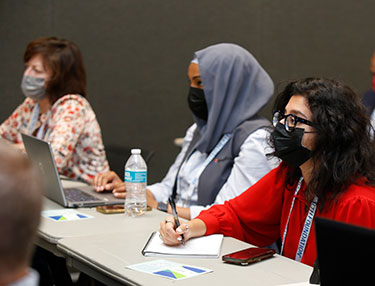As the world’s population experiences the effects of climate change on physical and mental health, it becomes increasingly important to create new approaches to building climate resilience that are inclusive of varying voices.
It will take multiple actors from across multiple sectors working together to mitigate climate risks — and do so equitably — said presenters during the APHA 2022 Monday session “Climate Change and Health Equity: A Multi-Sector Approach to Creating a More Resilient Future.” Moderated by Chris Kabel, senior fellow with The Kresge Foundation, the session featured presentations by three individuals who spoke about the importance of creating climate-resilient communities and ways to accomplish that goal.
Kimberly Lyle, with the Dorchester Bay Economic Development Corporation, focuses on transportation advocacy and is involved with the Fairmount Indigo Corridor, an area along the Massachusetts Bay Transportation Authority route that faces stark health disparities when compared to nearby neighborhoods.
Corridor, an area along the Massachusetts Bay Transportation Authority route that faces stark health disparities when compared to nearby neighborhoods.
Citing 2019 data from the Boston Public Health Commission, Lyle said childhood emergency department visits for asthma for people along the Fairmount Indigo Corridor are 30% higher than Boston overall. Hospitalizations for heart disease there are 12% higher than in Boston overall.
According to Lyle, residents within the corridor face higher risk factors for poor health when compared to Massachusetts overall. The area is also a low-income community of color. Lyle said when people in the corridor talk about climate change, they often don’t realize it.
“People feel the effects [of climate change] in small, everyday ways,” she said. “It’s not about ‘save the rainforest,’ ‘save the whales’ or proselytizing about veganism. It’s things like more frequent heat waves and higher utility bills.”
Gary Cohen, with Health Care Without Harm, said his organization looks for solutions at the intersection of climate, health and equity with the goal of protecting public health from climate change.
“Climate change is a force multiplier; it’s the biggest threat we face,” he said. “It’s affecting people all over the world and is coming home everywhere.”
Cohen emphasized the need to focus on climate change as it relates to health and said health professionals are instrumental in changing the narrative.
“There’s the Hippocratic oath, ‘Do no harm,’ but what does it mean when nine out of 10 people in the world are breathing unhealthy air? Health professionals can change the narrative and say climate change is a significant health risk. We can’t have healthy people living on a sick planet,” Cohen said.
Cohen said Health Care Without Harm is taking steps to reduce the use of petrochemicals and plastics in health care, raise awareness of greenhouse gas emissions in pharmaceutical manufacturing, and mobilize nurses to educate more than 50,000 health professionals on the effects of climate change on human health.
Katherine Catalano, deputy director of the APHA Center for Climate, Health and Equity, said the CCHE raises awareness within the public health field, promotes policies focused on environmental justice and climate change mitigation, and supports scientific research to guide decision-making.
The CCHE is focused on impacting policy at all levels, but Catalano said the most effective results tend to happen at the local level.
“Federal policies are important, but they are typically undone by the next [presidential] administration and can be slow and incremental to implement,” she said.
“The real work is done at the community level.”
Catalano echoed the other speakers, saying the time for action is at hand.
“For a long time, we acted like it was just a scary story, that climate change was a long way off, but it’s here and we can’t ignore it,” she said.
APHA’s CCHE leads public health efforts to inspire action on climate and health, advance policy and galvanize the field to address climate change.
With a longstanding commitment to climate as a health issue, the center applies a health equity lens to help shape climate policy, engagement and action to justly address the needs of all communities regardless of age, geography, race, income, gender and more.
Photo by EZ Event Photography.